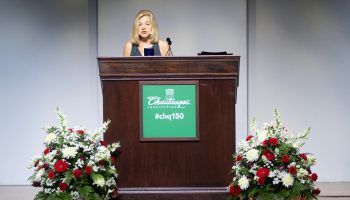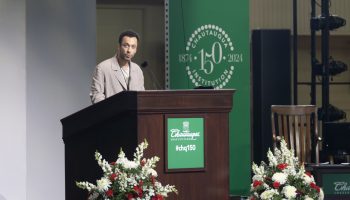NICK DANLAG – STAFF WRITER
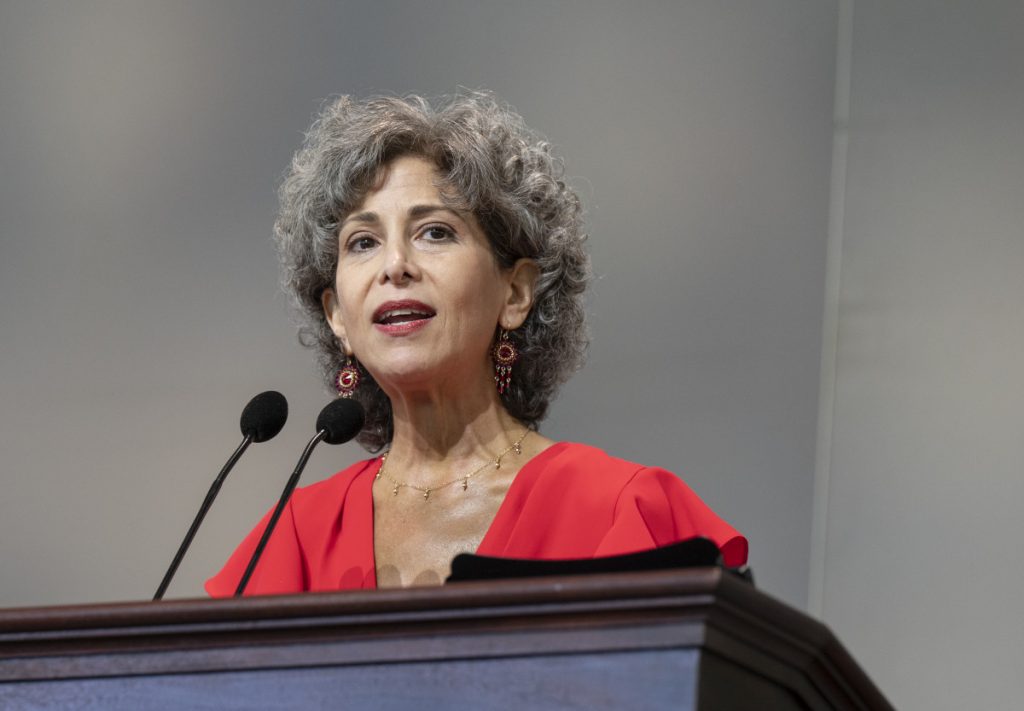
Climbing the corporate ladder often comes with increased time away from family and children, leading to fractured homes. Jackie Acho, president of strategy and leadership consulting firm The Acho Group, says career success also can cause people to sacrifice their physical health, spending long hours sitting down and shorter times sleeping.
But there is also a “shadow cost,” as Acho calls it, of more workers becoming disengaged, tired and unable to muster empathy in the workplace.
“Sapped empathy isn’t fatal in the short term unless you carry a gun,” Acho said. “What I’ve learned in working with the Cleveland Police for six years is that they aren’t so different from the rest of us. And that’s what’s both reassuring and scary.”
Acho works with the Cleveland Police Department to foster more empathy from within, and to connect officers with the community. She has found reform is more effective when it is driven from within the police department, and not from outside.
Acho, author of Currency of Empathy: The Secret to Thriving in Business & Life, presented her lecture at 10:30 a.m. on Wednesday, Aug. 4 in the Amphitheater. It was titled “The Future of Policing: What’s Empathy Got to Do with It?” and was part of Week Six’s theme of “Building a Culture of Empathy.” She explored the complexities of righting a 160-year-old ship, featuring voice clips from Cleveland community members and detectives, one of whom came on stage for the Q-and-A session.
Empathy wasn’t Acho’s starting point. In 1994, she earned her doctorate in chemistry at MIT.
“Logic. Data. Cold, hard facts. That’s what we valued. Every clever question seemed worthy of investigation,” Acho said.
It wasn’t until she had children that Acho said she “woke up to empathy.” This surge in empathy in parents is physiological. Research has shown parts of the brain tied to empathy lit up when new parents were shown pictures of newborns, “proving what our grandmothers could have told us all along; hands-on caring grows empathy,” Acho said.
She defined empathy as “the ability to understand the feelings of someone else, and have an appropriate emotional response.” Acho said the last part is important — and overlooked.
She said empathy often gets a bad name because it is confused with when people project emotions onto others or simply listen to how it affects them.
“Empathy is relational. Empathy is mutual. Empathy is sitting with, not necessarily solving, not taking your own trip,” Acho said. “Of course, you can offer perspective if it’s wanted and sometimes that’s helpful. But also, sometimes, it’s healing just to truly be heard.”
The first part of empathy is affective empathy, also called emotional or primitive empathy.
“That was the first to develop in us as babies before we had words to communicate our needs,” Acho said. “We heard a lot about that yesterday with chimpanzees with Dr. de Waal. Hopefully, someone responded when you were an infant and you had needs, so that primitive part of empathy got a good foundation in you.”
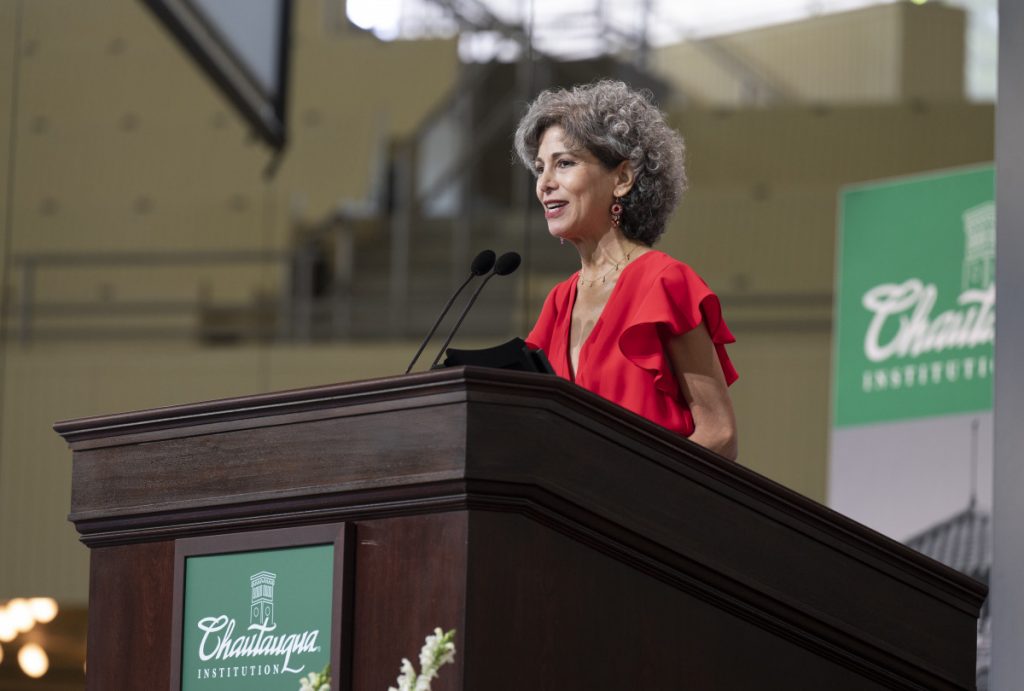
The second is cognitive empathy, which requires a person to imagine the perspective of the other person. Both need to be developed for effective communication.
“If we train people in cognitive empathy, and they don’t have a good foundation of affective empathy, it simply teaches them to manipulate, or worse,” Acho said. “The definition of a psychopath is someone who has super high cognitive empathy, but no ability to feel.”
In a ride-along with the Cleveland Police in 2017, Acho saw firsthand the responsibilities police face. The neighborhoods in which they work suffer from years of disinvestment and redlining. Acho also said the tools police have aren’t enough to fix the issues they see every day.
“Police are often the last touch points of humanity in a system where schools are failing,” Acho said. “Toxicity and intergenerational trauma make it hard for citizens to thrive.”
This seemingly “endless stream of pain” can make people shut down, but Acho said many in the community appreciated the work of the police. During this ride-along, she accompanied the police on a call to a foster mother whose child had thrown a brick at a lamppost. The situation was calm when police arrived, but there were still deeper problems.
“No one was solving the fact that this was her sixth home, she was only 11, her foster sisters erased the music on her phone and she was already heavily medicated for ADHD,” Acho said. “It seemed like she needed a hug more than anything, and she accepted one from me. I’ve often thought about how little good that helps against the thrashing waves of her life.”
The 4th District of Cleveland, in which Acho did her ride-along, is statistically the most violent in the city.
“Like many challenged areas, the 4th District is a place where we as a country have redlined, disinvested and left generations to fend for themselves without clean, lead- and mold-free homes, good schools or adequate grocery stores,” Acho said.
She then shared with the audience a video of community leader Marilyn Burns. Burns talked about her role in the community, which included simply listening.
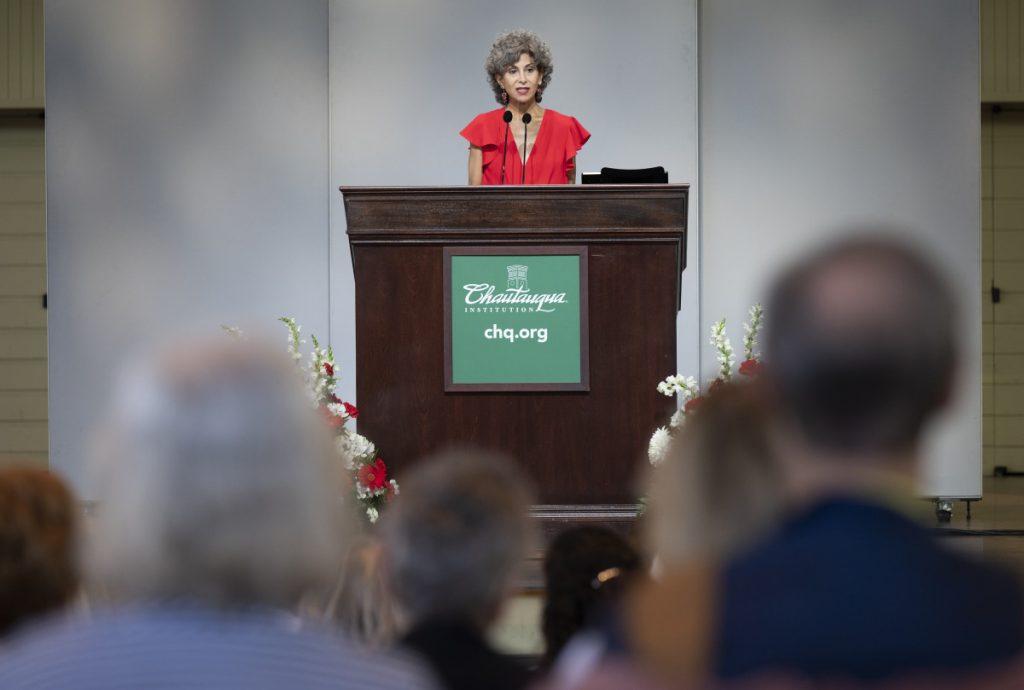
“One of the biggest elephants in the room where I live is mental health. It’s so much going on, with one episode of something going on to the next episode. People are constantly coming to me, asking for advice, needing a resource, needing whatever prayer, whatever it might be,” Burns said. “Maybe they just want to cry, just sit there for a while and just say, ‘Thank you for just being here.’ ”
Acho then shared a video clip of Cleveland Police 4th District Commander Brandon Kutz. He said the district has 90,000 people, which is one-fourth of the city, and the department receives around 71,000 calls annually.
The district has 220 police, detectives and supervisors.
“The 4th District, even though we’re very busy, and it can be very violent at times, is also a place that has amazing neighborhoods,” Kutz said. “Amazing people living here and working here. People that are passionate about life and about wanting to have a safe and productive neighborhood.”
Kutz makes it a point to connect officers with the community.
“You’re going from one person in crisis to the next person in crisis and people in crisis are not having a normal day, “ Kutz said. “It’s really important for me to make sure that my officers remember what ordinary looks like, and the people that are not in crisis in this district that need their service and need them to be there.”
A video played of Detective Michael Williams explaining day-to-day routines of officers. Patrol officers answer calls from citizens, ranging from alarms and car accidents to more serious crimes like assaults or shootings.
“But when we’re not answering calls, then we focus on community policing, and that goes from stopping playing basketball with the kids to just stopping at somebody’s house who’s having a barbecue, and just really talking together,” Williams said.
Lastly, Acho showed Detective Chris Gibbons, a longtime Cleveland police officer who works in employee assistance.
“I came down here and was just kind of overwhelmed with what was on our plate, the empathy, crushing things to officers we’re dealing with on a daily basis. And I just became overwhelmed,” Gibbons said.
Gibbons said he made an effort to make himself and other officers more proactive, rather than reactive, and to strengthen relationships between the police and the community every day.
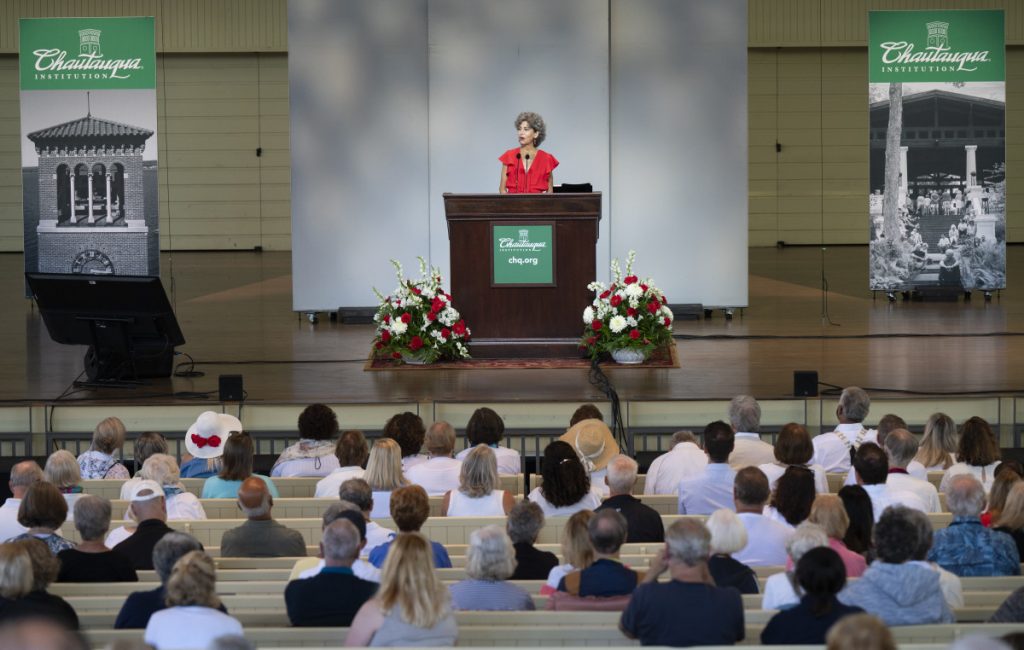
Acho’s work with the Cleveland Police began in 2014 after she gave a TEDx talk about empathy and Gibbons called her.
“I nearly dropped the phone. My experience of the police to that point was getting pulled over for speeding,” Acho said.
She had also been watching the news and saw the coverage of the shooting of Tamir Rice and the chase in Cleveland that left Timothy Russell and Malissa Williams dead. She said Gibbons was intensely interested in reducing fear and stress for police and citizens.
So Acho agreed to help and created an in-depth engagement survey for employees focused on empathy. She joked to Cleveland Police Chief Calvin Williams that surely the department had done a survey before.
“(He said) never. Not in the 160-year history of the Cleveland Police, at least up to that point anyway,” Acho said. “We didn’t use the ‘E’ word at first, but the chief understood what we aimed to do, and Commander Kutz raised his hand to start. The initial scores were painful to absorb. To be honest, it wasn’t much worse than other organizations we’ve seen because, remember, most workplaces are painful.”
Acho then talked and showed videos about actions the police department took. They created a five-point leadership model, which broke down leadership traits, such as vision of the future and connection to the community, and then chose people within the building who modeled one or more of those traits. They also choose people for an innovation team who could represent everyone in the building, so people of all experience levels, races and genders felt included.
“There wasn’t anything we couldn’t overcome, because somebody on the team had an answer for it, which was amazing,” Kutz said.
By creating this model, Acho said, the department didn’t have to guess who would be the best leaders, and also who to hire and fire.
“I was surprised, but I shouldn’t have been. Good cops are in it for service. They want to help and when they get to a scene, they can’t slink down in their chair and say, ‘He’ll take care of it,’ ” Acho said. “They have to problem-solve. They work in diverse teams; their lives depend on the person riding next to them.”
They also streamlined peer recognition, meaning good officers would be promptly rewarded, created a better system for mandatory overtime, fixed lighting in hallways and built a breakroom.
“Some of that may sound superficial, but when I first showed up, the bathrooms didn’t even have locks. There wasn’t always toilet paper,” Acho said. “How can we ask people to risk their lives if it feels like we don’t care about them at all?”
The department also included meditation and yoga practices for the officers, which gave many officers the space and ability to process the trauma they experienced almost daily.
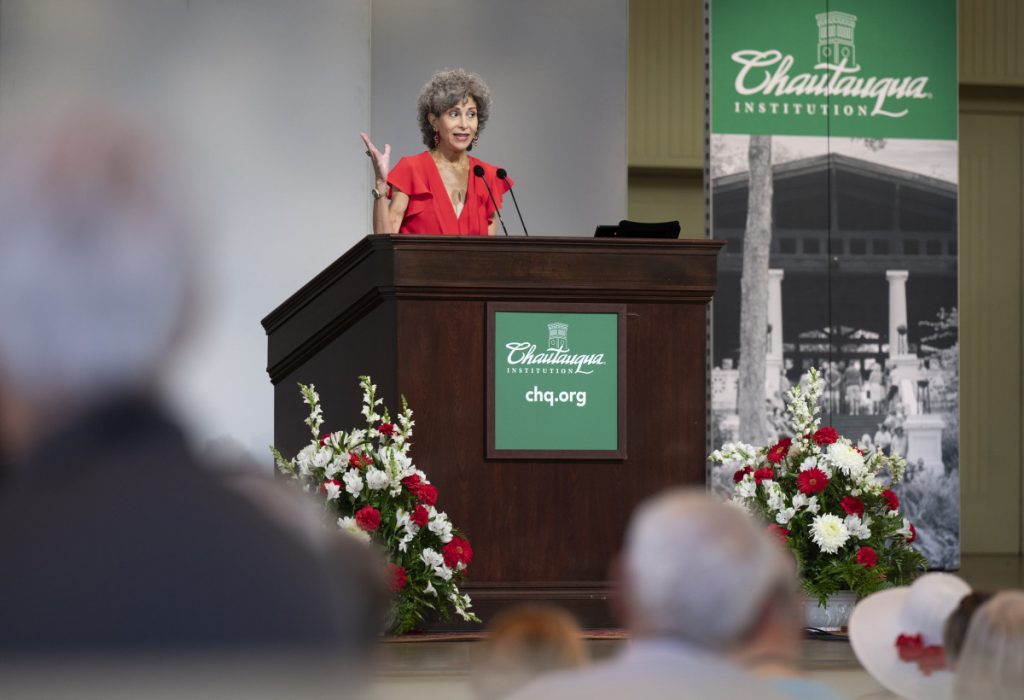
And what did all of these do? A lot, Acho said. From 2017 to 2018, complaints from the community dropped 42%, and there was a 29% drop in use of force by officers. And 53% of all police officer transfers were into the 4th District.
“A lot of that is because they heard about the work that we’re doing,” Lutz said. “I’ve heard all kinds of positive feedback from the people that came back here that maybe left before. They couldn’t believe it was the same district that they had left five years ago.”
And they tackled major issues, such as race and the police’s relationship with communities.
Williams, who grew up in the 4th District, worked during the months after George Floyd’s murder.
“With everything that’s been going on within the past year and a half, it has been sort of difficult, because I am a young, African American male. But at the same token, I’m also a police officer,” Williams said. “People expected me to disown the police department and just throw everything I had going on and come join them and what was going on. When that didn’t happen, then I became every name in the book but my real name.”
Acho has been through a lot along with the police department, and she looks forward to more.
“I also know personally how the work-family balance in this country can take a toll on people’s health. We burn the candle at both ends and still volunteer to help parents, friends, others in the community,” Acho said. “Take good care of you. You can’t give what you don’t have, including empathy.”
As part of the Q-and-A session, Kutz joined Acho on stage. Chautauqua Institution President Michael E. Hill asked them to unpack the phrase “defund the police,” and how society can get greater budgetary resources dedicated to empathy.
“I think the term ‘defund the police’ is scary,” Kutz said. “I think it causes fear in our cities. Our residents are scared of that. The truth is, we are needed. There’s enough violence and mayhem and chaos going on in the city that we need more police officers than we have now to deal with what we have.”
He believes other government agencies, such as social services, need more funding and support.
“These other government agencies should get the funding and support they need to have an impact in the community,” Kutz said. “If they’re out there doing that work, it makes our work a lot easier. We can focus on the things that are most important, as far as law enforcement in the community and leave the social services to the experts in that.”
Acho agreed.
“The only thing that I would say is a lot of what we did didn’t cost a lot of money, that has more to do with where we put our attention,” Acho said. “So I don’t think it would be a big stretch to fund empathy work in other police departments.”



